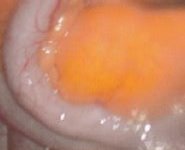| Back to Back Issues Page |
 |
|
What Are The Symptoms Of Appendicitis - Seven Signs To Look Out For February 16, 2015 |
Have you ever woken up with a niggling pain on your abdomen and thought to yourself - could this be my appendix? If you have had your appendix taken out, what was it like when you had the pain from an acute appendicitis? For some strange reasons, appendicitis and how to tell the symptoms of appendicitis took the "front burner" in global medical news this week. Especially is this important, with the finding of a new sign, if present, could help to increase the accuracy of diagnosis of this medical problem by as much as 97%. We thought we should share with you quickly, the latest research findings on this topic, as well as seven signs of appendicitis symptoms and what to do to help prevent appendicitis in children and adults. So, what are the symptoms of appendicitis?  Appendicitis is the inflammation or infection of the blind end tube at the start of the large intestine, about the size of the little finger, called the appendix.
Appendicitis is the inflammation or infection of the blind end tube at the start of the large intestine, about the size of the little finger, called the appendix.
The lumen or cavity often gets blocked, and then becomes infected. If this infection is not recognized and treated on time, the appendix could rupture, letting out feces and bowel content into the abdomen, causing a widespread infection of the whole of the abdomen and death. This condition is so common, yet could be very difficult to diagnose. These are seven top signs and symptoms of appendicitis to aid recognition and diagnosis:
If you have abdominal pain in the lower right side of the abdomen, with one or more of the above symptoms that started in the last two or three days, there is a very high chance that you may be suffering with acute appendicitis. Seek medical attention now. But how can you tell if your lower abdominal pain is due to other conditions that mimics appendicitis, like mesenteric adenitis in children, urine infection, ectopic pregnancy and a few more medical conditions? The December 2012 Christmas edition of the British Medical Journal , in a research conducted by Dr Helen F Ashdown of University of Oxford, UK, reports a new sign to look out for with as much as 97% accuracy that helps to point to the presence of appendicitis, if present: pain on travelling over speed bumps!
In the article, she reported that "presence of pain while travelling over speed bumps was associated with an increased likelihood of acute appendicitis." - italics ours. So, if you have a lower right sided abdominal pain made worse on going over a speed bump on your way to the hospital, do not forget to mention this to your doctor. That information could help improve your chances of having the right diagnosis. Prevention of AppendicitisMedical research has established that the first step in the development of appendicitis in anyone is the obstruction of the lumen of the appendix.This is often caused by imbalance in the bowel function, especially as it relates to movement of materials down the gut. Low fibre diet (very common in western diet), increases the chances of developing appendicitis - 70,000 cases of appendicitis are operated upon every year in the UK alone!
Another very common cause of appendicitis is the inflammation and swellings of the glands on the wall of the appendix due to exposure to bad bacteria, parasites , worms or imbalance of the right mix of good bacteria.
You can prevent or reduce your chances of suffering with appendicitis by:
Get More Info on Natural Remedies for Stomach and Digestive Disorders that can help improve your digestive health and bowel functioning.
We have looked at what are the symptoms of appendicitis. In our next issue, we shall be discussing the best treatment options for acute appendicitis - to operate or not to: a treatment dilemma. I hope you enjoyed this article on Abdopain Weekly - your weekly online magazine on causes and treatment of abdominal pain and more. Please if you want to find out more on what are the symptoms of appendicitis or related information, go to our main page on this topic at abdopain.com/appendicitis.
For more info on digestive health, see Natural Remedies for Stomach and Digestive Disorders.
If you have had appendicitis and your appendix removed, we would love to hear from you. So please leave us your experience on this topic by hitting the reply button and share what your experience with this condition was like - from the onset of symptoms, diagnosis, surgery and after surgery. Thanks for reading See you next week. Dr O Edema MD CCFP MRCGP MSc DRCOG On behalf of,
|
| Back to Back Issues Page |
